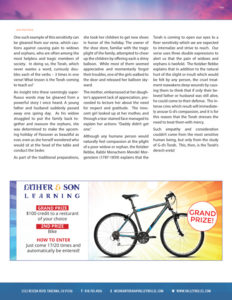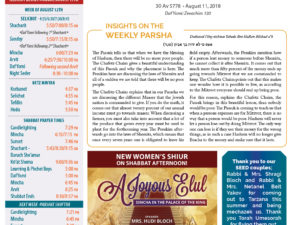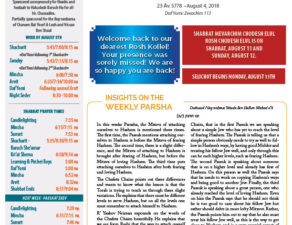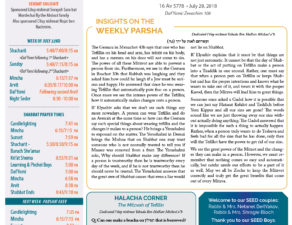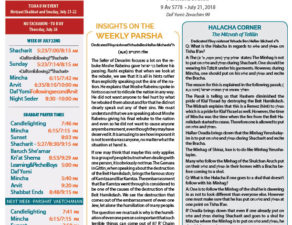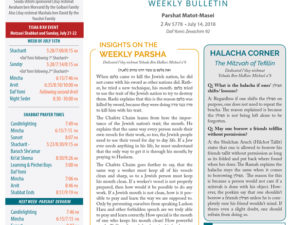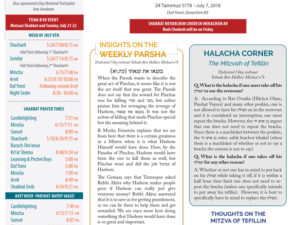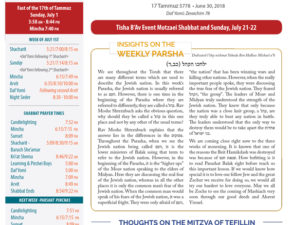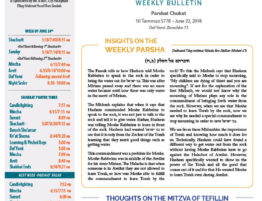
Insights on the Parsha
More than Good Behavior
by Rabbi Ozer Alport
כל אלמנה ויתום לא תענון. אם ענה תענה אתו כי אם צעק יצעק אלי שמע אשמע צעקתו
“You shall not cause pain to any widow or orphan. If you [dare to] cause him pain – for if he shall cry out to Me, I shall surely hear his outcry.” (Shemot 22:21-22)
The Mishnah in Ethics of our Fathers (Pirkei Avot 3:17) teaches that “without derech eretz (literally “the way of the land,” but traditionally used to refer to proper conduct and behavior as defined by the Torah), there can be no Torah, and without Torah, there cannot be derech eretz.” This statement seems to present an enigmatic catch- 22 regarding the initial attainment of both Torah and derech eretz.
In his commentary on this Mishnah, Rabbeinu Yonah of Gerona (1180-1263) resolves the apparent contradiction by explaining that the Mishnah is discussing two distinct types of derech eretz. The first derech eretz refers to what is commonly known as essential good manners and interpersonal skills, which one must possess as a prerequisite to beginning to study Torah. The second derech eretz refers to an exceptional and heightened sensitivity to others, which can only be acquired through studying Torah.
One such example of this sensitivity can be gleaned from our verse, which cautions against causing pain to widows and orphans, who are often among the most helpless and tragic members of society. In doing so, the Torah, which never wastes a word, curiously doubles each of the verbs – 3 times in one verse! What lesson is the Torah coming to teach us?
An insight into these seemingly superfluous words may be gleaned from a powerful story I once heard. A young father and husband suddenly passed away one spring day. As his widow struggled to put the family back together and reassure the orphans, she was determined to make the upcoming holiday of Passover as beautiful as ever, even as she herself wondered who would sit at the head of the table and conduct the Seder.
As part of the traditional preparations, she took her children to get new shoes in honor of the holiday. The owner of the shoe store, familiar with the tragic plight of the family, attempted to cheer up the children by offering each a shiny balloon. While most of them seemed appreciative and momentarily forgot their troubles, one of the girls walked to the door and released her balloon skyward.
The mother, embarrassed at her daughter’s apparent lack of appreciation, proceeded to lecture her about the need for respect and gratitude. The innocent girl looked up at her mother, and through a tear-stained face managed to explain her actions: “Daddy didn’t get one.”
Although any humane person would naturally feel compassion at the plight of a poor widow or orphan, the Kotzker Rebbe, Rabbi Menachem Mendel Morgenstern (1787-1859) explains that the Torah is coming to open our eyes to a finer sensitivity which we are expected to internalize and strive to reach. Our verse uses three double expressions to alert us that the pain of widows and orphans is twofold. The Kotzker Rebbe explains that in addition to the natural hurt of the slight or insult which would be felt by any person, the cruel treatment reawakens deep wounds by causing them to think that if only their beloved father or husband was still alive, he could come to their defense. The intense cries which result will immediately arouse G-d’s compassion, and it is for this reason that the Torah stresses the need to treat them with mercy.
Such empathy and consideration couldn’t come from the most sensitive human being, but only from the study of G-d’s Torah. This, then, is the Torah’s derech eretz!


